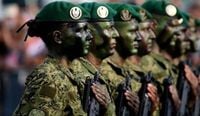On October 24, 2025, Croatia took a historic step by reinstating compulsory military service, ending a 17-year hiatus that began when the country embraced a fully voluntary armed forces system in 2008. The move, approved by a decisive vote in the Croatian parliament—84 in favor, 11 against, and 30 abstentions in the 151-member chamber—has sparked widespread discussion both within Croatia and across Europe. The measure comes at a time of heightened military tensions on the continent, particularly as Russia’s invasion of Ukraine continues to cast a long shadow over European security.
According to Euronews, which cited Croatia’s public broadcaster HRT, the newly mandated service will require young citizens to undergo two months of basic military training. The Croatian Ministry of Defence explained that the core aim is to equip the nation’s youth with essential skills and knowledge “needed in crisis situations, so they would contribute to national security.” Authorities have announced that conscripts born in 2007 will be the first to receive call-ups for medical examinations, a process set to begin by the end of 2025.
This policy shift reflects a broader European trend. As noted by Euronews, several countries—including Lithuania, Sweden, and France—have recently revived or expanded forms of mandatory national service, while others like the Netherlands and Germany have boosted voluntary recruitment. The context is unmistakable: Russia’s aggression against Ukraine, which began in 2022, has reignited debates about military readiness and national defense across the continent. German Defence Minister Boris Pistorius summed up the prevailing sentiment earlier this year, stating, “A strong army, in terms of personnel and equipment, is the most effective means of preventing wars.”
Croatia’s decision is particularly significant given its recent history. The country endured devastating conflicts during the Balkan wars of the 1990s, and while it has since become a member of both NATO and the European Union, regional security concerns have persisted. According to a report from rayhaber.com, the Balkans have experienced a military buildup in recent years, and relations between Croatia and its former wartime adversary Serbia remain tense. In this climate, Croatia’s move to bolster its armed forces is seen as a step to strengthen national defense and prepare for any potential spillover from the ongoing war in Ukraine.
The reintroduction of conscription is not without its nuances. The Croatian Ministry of Defence has emphasized that the service period will be relatively short—just two months—and focused on imparting foundational military skills rather than advanced combat training. Those drafted will receive a salary, a measure intended to recognize their contribution and perhaps soften the transition back to a system many younger Croatians have never experienced. For those who object to military service on ethical or religious grounds, the law provides an alternative: conscientious objectors can opt to complete civilian service instead, ensuring that the policy respects individual rights while still contributing to the nation’s preparedness.
Public reaction in Croatia has been mixed, mirroring debates seen in other European countries that have revisited conscription. Some citizens, particularly older generations who remember the wars of the 1990s, view the return of compulsory service as a prudent precaution. Others, especially among the youth, have expressed concern about the disruption to their education or early careers. Yet, as authorities and lawmakers have argued, the rapidly changing security environment in Europe demands a new level of readiness.
“The main aim of this move is to teach young people the basic skills and knowledge needed in crisis situations so that they can contribute to national security,” the Croatian Ministry of Defence stated, as reported by HRT and rayhaber.com. This sentiment echoes the arguments made by policymakers across Europe who see military service not just as a means of defense, but as a way to foster civic responsibility and resilience among young citizens.
The timing of Croatia’s decision is telling. The war in Ukraine has not only upended security calculations in Eastern Europe but has also prompted a broader reassessment of military capacities across the continent. Neighboring countries have watched Russia’s actions with growing alarm, and the specter of conflict spilling over into other regions has become a genuine concern. As Euronews pointed out, the move by Croatia fits into a pattern of European nations seeking to “bolster national defence preparedness amid fears of the war in Ukraine potentially spilling over into neighbouring regions.”
For Croatia, the return to conscription represents a balancing act—one that seeks to address legitimate security threats while respecting democratic values and individual freedoms. The policy’s design, with its short duration and provision for civilian service, reflects an attempt to modernize the concept of national service for the twenty-first century. It also signals to both domestic and international audiences that Croatia is serious about its defense obligations as a member of NATO and the EU.
The broader implications of Croatia’s move are still unfolding. Some analysts see it as part of a regional arms race, particularly in the Balkans, where memories of past conflicts remain fresh and the potential for renewed tensions lingers. Others argue that the trend toward reintroducing conscription reflects a recognition that volunteer armies alone may not be sufficient to meet the demands of modern security challenges.
It’s also worth noting that Croatia is not alone in facing these dilemmas. As Euronews reported, countries like Lithuania and Sweden have already brought back forms of compulsory service, while France has experimented with new models of national service aimed at fostering social cohesion as well as military readiness. Germany, meanwhile, has debated expanding its own recruitment programs, with Defence Minister Pistorius making a forceful case for maintaining a robust and well-equipped military.
As authorities prepare to implement the new policy—beginning with medical examinations for those born in 2007—attention will likely turn to how the measure is received by the public and whether it achieves its stated goals. Will two months of training be enough to instill the skills and mindset needed for national defense? Can the program adapt to the diverse needs and aspirations of Croatia’s youth? Only time will tell, but for now, the country has made its choice, joining a growing chorus of European nations determined to meet the uncertainties of the future with renewed vigilance.
Croatia’s return to conscription is a reminder of how quickly the security landscape can change, and how nations—large and small—must adapt to new realities. As Europe grapples with the fallout of war and the challenge of maintaining peace, such decisions carry weight far beyond their borders.




